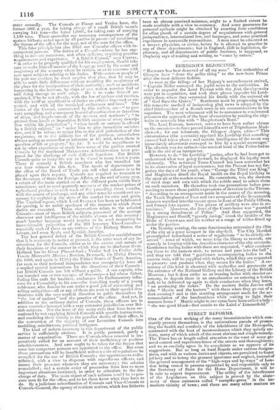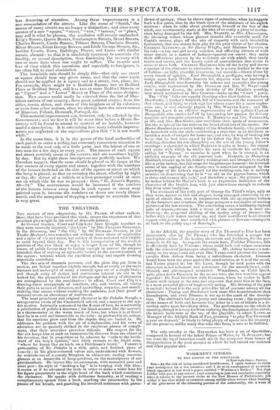STREET REFORMS.
ONE of the most striking of the many inconsistencies which con- stantly present themselves, is the ostentatious parade of promo- ting the health and comforts of the inhabitants of the Metropolis, contrasted with the host of inconveniences which they quietly en- dure, many of which admit of the most obvious and simple remedy. The Times has at length called attention to the want of some ge- neral control and superintendence of the streets and thoroughfares; and we as cordially agree in its complaints as we approve of its suggestions. But so long as local Boards under various designa- tions, and with as various duties and objects, are permitted to foster jobbery and to betray the grossest ignorance and neglect, instead of the general management of the "high-ways and by-ways" of Lon- don being vested in persons appointed by and responsible only to the Secretary of State for the Home Department, it will be in vain to expect improvement. The utility of the interference of the Legislature on this subject is proved by the abate- ment of those nuisances called " turapike-gates: in the im- mediate vicinity of town ; and there are many other, matters no less deserving of attention. Among these improvements is a new nomenclature of the streets. Like the name of "Smith," the names of many streets are no longer a distinction ; and since every creator of a new "square," "Street," "row," "terrace," or "place," may call it what he pleases, the confusion will remain unchecked. King's Streets, Queen Streets, Southampton Streets, Broad Streets, Charles Streets, Castle Streets, Princes Streets, Charlotte Streets, Silver Streets, Great George Streets, and Little George Streets, &c., besides Courts, Rows, Buildings, Places, and Lanes with similar names, abound : so that it is absolutely necessary to ascertain the locality, or second description, thus burdening the memory with two or more facts when one ought to suffice. The trouble and loss of time which this occasions, and especially to foreigners, is too often felt to need elucidation.
The invariable rule should be simply this—that only one street or square should bear any given name, and that the same name should not be applied to a square and to a street, row, place, &c. For example, there might be a Bedford Square, but no Bedford Place or Bedford Street, still less two or more Bedford Streets, or an "Upper" and a "Lower" Street or Place of the same designa- tion. New names could easily be selected from the list of illus- trious natives of our country ; from great national events ; from the cities, towns, shires, and rivers of this kingdom or of its colonies ; or even front other nations, since we already have the street-names of Hanover, Poland, Denmark, Portugal, &c.
This material improvement can, however, only be effected by the Government ; and we fear it will be some time before a Home Se- cretary will be found to attend to matters of so humble, however useful a description. It is astonishing how many valuable improve- ments are neglected on the supercilious plea that "it is not worth while."
In the mean time, it is in the power of the local authorities of each parish to order a trifling but extremely convenient attention to be made at the cost only of a little paint and the labour of one or two men for a few days in every year. The names of each square and street certainly occur at the corners, and are sometimes legible by day. But by night these inscriptions are perfectly useless. We therefore suggest, that the name should be placed on the lamps at the four corners of every square and street, together with the numbers of the houses included on the side of the square or street on which the lamp is placed, so that on entering the street, whether by night or day, the driver of a vehicle or a foot-passenger could at once see on which side he was to proceed : thus, "St. James's Square, 40-78." The convenience would be increased if the numbers of the houses between every lamp in each square or street were painted upon it, because the numbers on doors are rarely illumi- nated, and the annoyance of stopping a carriage to ascertain them is very great.



























 Previous page
Previous page